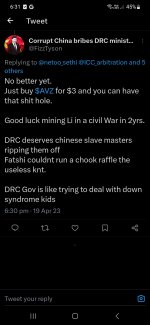Carlos Danger
Top 20
Fun fact people would stop talking shit about the DRC officials if they simply did their job and granted Dathcom its mining licence that passed all regulatory hurdles except the calculation of surface rights. It's been 2 fucking years since we applied. The mine could be operational by now if it had been expedited as promised.Fact is a certain percentage of this sh1t cannot be stopped . Anti AVZers use SM as their weapon . It's up to the DRC gov to use some common sense . The only people they should be listening to is Nigel and his team . If it doesn't come from them then it should mean SFA . Fair enough genuine investors could be a little more mindful , but if the DRC gov are considering what is posted on social media by strangers/ impostors as part of their final decision making then it's not going to help us.
Last edited:

